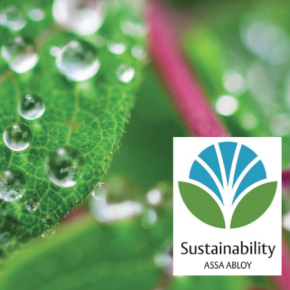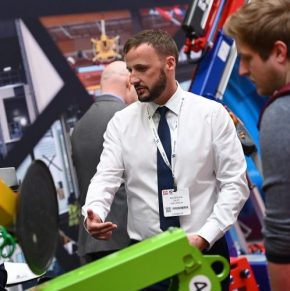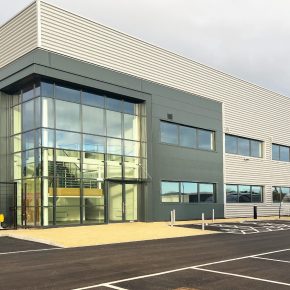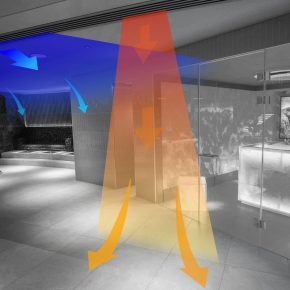
Innovation and sustainability must go hand-in-hand
The evolution of technology and demand for sustainable products is driving innovation, which is fast becoming the biggest source of revenue growth and value delivery for all areas of business, including manufacturing.
Brian Sofley, managing director at ASSA ABLOY Security Doors, discusses why sustainability and innovation in doorset manufacturing are closely linked in the latest issue of ABC+D magazine.
There are opportunities for UK doorset manufacturers to capture significant short-term and long- term value within the manufacturing process if they embrace both efficiency initiatives and radical innovation.
Doorset manufacturers can no longer claim sustainability based on a few green decisions. Instead, the whole process from product sourcing, right through to the End of Life (EOL) of products must be carried out with sustainability in mind. This is especially important as, according to a recent survey, 66% of people are willing to pay more for sustainable products.
This is leading to considerable investment in R&D and innovation across manufacturing, helping to create a future- proof built environment.
The manufacturing process
As part of a Government report, it is estimated that CO2 emissions across current process chains can be reduced by 23-40% by adopting best practice across all plants and by adopting state-of-the-art technology.
With the help of technology, doorset manufacturers can develop ultra-efficient processes that enable them to make the most of raw materials in an environmentally-friendly way, in turn further reducing emissions. Sustainable manufacturing processes produce fewer side effects on the environment, for example less greenhouse gasses are formed as products are made.
ASSA ABLOY Security Doors has invested in a new manufacturing process that is decreasing lead times for customers, having a positive impact on the environment and improving product quality, using automation and seamless punching and folding capabilities of high technology CNC equipment, combined with a fast, heat cured bonding system, ensuring improved precision and accuracy.
Each stage of the new manufacturing process requires little or no manual handling compared to the previous production line. As a result, manufacturing times have been greatly improved and waste has been reduced during the manufacturing process.
Ongoing costs
Moving on from the manufacturing process, it is becoming apparent that companies can no longer afford to make large project investments without justifying the long-term cost implications.
Although actual initial cost will always take precedent, there is a growing emphasis on the associated costs over a period of time, especially on Government or public sector tenders. This is why building materials or products should prioritise quality in the design and manufacturing process.
This focus on the lifespan of a project is common throughout the construction sector, but Government-funded buildings in particular are under increasing pressure to deliver savings. A factor further encouraging this approach is the introduction of BIM, a technology that is promoting the demand for sustainable products.
BIM enables specifiers to gain a clear insight into the build process, enabling them to specify products that fit into the wider building design. Ultimately, this can help to improve operational and environmental costs of products, over the lifetime of a building.
As well as the quality of a product, which itself can be a subjective term, specifiers will also need to take the application into consideration in order to understand the true lifecycle implications.
For example, doors used in busy hospitals with a large amount of through-traffic and heavy equipment, will, by their nature, have a shorter life span and require a more durable material.
It is crucial that specifiers work with manufacturers who fully understand industry pressures, who will provide a long-term and sustainable solution, as opposed to an affordable commodity product that offers initial cost savings but no long-term benefits.
Conclusion

“Sustainable manufacturing processes produce fewer side effects on the environment, for example less greenhouse gasses are formed as products are made” Brian Sofley.
We are moving into a time where environmental integrity is becoming more measurable than ever before, with manufacturers being called upon to produce tangible results that architects and contractors can present to their clients.
It is clear that sustainability must be a key consideration for manufacturers right from the outset of projects, which will drive innovation in the industry.
From obtaining resources in an environmentally sound manner, to ensuring all manufacturing processes limit energy consumption, these steps will pay dividends to the sustainability of the built environment. In turn, this will help architects and contractors to make informed, green decisions during the specification stage of projects.
Innovation is the key to sustainability, as manufacturers must continue to develop products and processes that reduce environmental impact and puts the needs of the client first.
Latest news

2nd April 2025
FIT Show 2025 Launches Innovative Marketplace Feature to Enhancing Value for Installers
FIT Show, the UK’s leading event for the window, door, flat glass, hardware, and roofing industries, is excited to announce the launch of a brand new Marketplace feature at its upcoming 2025 event (Birmingham NEC, 29 April – 1 May).
Posted in Architectural Ironmongery, Articles, Building Industry Events, Building Industry News, Building Products & Structures, Doors, Exhibitions and Conferences, Glass, Glazing, Hand Tools, Innovations & New Products, Plant, Equipment and Hire, Power Tools, Restoration & Refurbishment, Retrofit & Renovation, Roofs, Seminars, Training, Windows
2nd April 2025
Hi-spec deployment of EJOT Colorfast at new Birmingham logistics park
EJOT Colorfast fasteners have been used extensively in the construction of eight new high-specification warehousing and logistics buildings at the Urban 8 Logistics Park in King’s Norton, Birmingham.
Posted in Articles, Building Industry News, Building Products & Structures, Building Systems, Case Studies, Facades, Restoration & Refurbishment, Retrofit & Renovation, Roofs, Walls
2nd April 2025
SWA member delivers ‘fresh Hope’ for university’s Sustainable Building department
A detailed contract to restore an iconic Art Deco building in the heart of Birmingham’s Jewellery Quarter was carried out by Steel Window Association member, The Window Repair Company (Northwest) Limited.
Posted in Articles, Building Associations & Institutes, Building Industry News, Building Products & Structures, Building Systems, Case Studies, Glass, Glazing, Restoration & Refurbishment, Retrofit & Renovation, Steel and Structural Frames, Sustainability & Energy Efficiency, Windows
1st April 2025
Gilberts Takes Thermal Comfort to New Heights
Gilberts Blackpool is continuing to build on its reputation as a pioneer with the unveiling of ThermaAstute™ – the most extensive range of thermally sensitive diffusers in the market.
Posted in Air Conditioning, Articles, Building Industry News, Building Products & Structures, Building Services, Facility Management & Building Services, Heating, Ventilation and Air Conditioning - HVAC, Innovations & New Products, Restoration & Refurbishment, Retrofit & Renovation, Sustainability & Energy Efficiency
 Sign up:
Sign up: